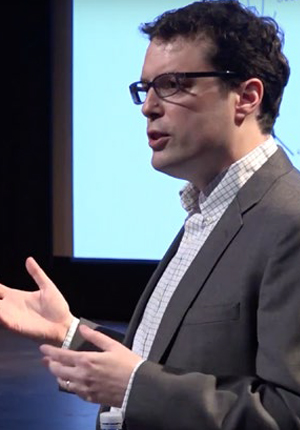Word Sleuth
Fans of Sherlock Holmes never cease to admire the fictional detective’s eye for the subtlest clues: a speck of gunpowder, a dusting of cigar ashes, or even the faint scrapes on a muddy shoe.
The detective work of a linguist can be equally impressive. Ben Zimmer, a Fulbright grantee who began his career by unlocking the mysteries of Sundanese wordplay in West Java, has emerged as one of America’s top word sleuths. In popular columns for the Wall Street Journal, the New York Times, and a range of digital outlets, Ben uncovers “the secret lives of individual words and phrases,” in order to demonstrate how “even seemingly nondescript items of our vocabulary have culturally rich stories to tell.”
Want to know how the term “mealy-mouthed” entered the modern lexicon? Rely on Ben to dig up a reference to a German volume published in 1566, in which followers of the Protestant reformer Martin Luther immortalized his use of the German idiom Mehl im Maule behalten, literally to carry meal— edible cereal grains—in one’s mouth. Luther used the term “to describe those who were less than forthcoming in their views about the Reformation,” as Ben wrote in an August 2017 column for the Wall Street Journal. And 451 years after the German publication, journalists used the same term to criticize a man who didn’t go far enough in denouncing white supremacist movements in the United States.
Many readers appreciate Ben’s ability to express his erudition with clear, communicative prose. “The way most linguists write is only intelligible to other linguists, while most popular writers on language in the general press tend to send linguists screaming in horror,” notes Uri Tadmor, a Boston-based linguist and publishing director for Brill, an international academic publisher. “Ben’s articles and lectures are among those precious few that capture the interest of both specialists and laymen.”
As a child growing up in New Jersey, Ben got a kick out of words, perusing a 1930s edition of Webster’s New International Dictionary. As an undergraduate at Yale University, Ben’s “laidback demeanor didn’t obscure his talent,” recalls linguistic anthropologist Joseph Errington.
But the 46-year-old columnist credits his experience in Indonesia in the 1990s as the springboard for real insight into the power of language. In a country consumed by a bureaucratic mania for acronyms and jargon, wordplay had become a potent weapon of the weak.
During his first Fulbright-supported stint in Bandung, it was “eye-opening to see how such playing with words could serve deeper purposes, whether for mystical exegesis or political subversion,” says Ben. “Doing my initial research at the tail end of the Suharto era gave me a good sense of how linguistic play could slyly undermine official New Order discourse.” After returning to the United States, Ben relied on internet channels to follow events leading to Suharto’s fall in 1998. “I saw the same kind of subversive wordplay that I had studied in the Sundanese context, now blowing up on the national stage,” he recalls.
For example, student activists seized on the acronym SDSB—a standard reference to a national lottery—and turned it into Suharto Dalang Segala Bencana, indicating that Suharto was the puppet-master of disaster. (To appreciate such turns of phrase, Ben refers readers to Mikhail Bakhtin’s study on François Rabelais’s talent for medieval parody.) Again, with Fulbright’s help, Ben returned to Indonesia for research in 1999–2000.
At first, the archipelago was barely on his radar. During Ben’s sophomore year at Yale, he thought he might sample various non-European languages, perhaps Persian or Swahili. He decided to focus on Indonesian after an inspiring introductory lecture by Joseph Errington, and attended classes taught by Tinuk Yampolsky, a native speaker and fiction writer. An intensive intermediate language course at Cornell University, in the summer of 1990, led to an advanced course in Malang, East Java, the following year. “After that first trip to Indonesia, I was really hooked and knew I wanted to come back after I graduated,” Ben says.
However, many researchers had already tackled the evolution of Indonesian and the intricacies of Javanese. Ben wanted to do something different. As he recalls, his Yale professor Joseph Errington steered him toward one of the most understudied languages on the planet, relative to its size: Sundanese, spoken by approximately 30 million people.
Given the rarity of foreigners’ efforts to master Sundanese, it was hard to find a decent textbook. Ben eventually wrote an article for Jurnal Sastra (published by Padjadjaran University in Bandung) pointing out the need for better pedagogical materials, other than books typically used by primary school students in Bandung. “The ability of a 6-year old Sundanese child is usually far beyond that of a foreigner who is already an adult!” he wrote.
Ben also chafed at the tendency to initiate foreigners into the most elevated and polite form of Sundanese, known as basa lemes, before wading into the more intimate, everyday sounds of basa kasar/loma. This made it difficult to converse with new friends of the same age, or gain an understanding of a broad range of creative arts, including short stories, pop song lyrics, and wayang golek, a traditional form of wooden puppetry imbued with philosophical meaning.
Fortunately, Ben found a variety of teachers, musicians, pesantren students, and others who supported his efforts to absorb their vocabulary and its cultural context. The fact that a foreigner could achieve fluency “reminded Sundanese people of the importance of maintaining and preserving their language,” remarks Cece Sobarna, a literature professor at Padjadjaran University.
“I was very impressed that with Ben’s expansive educational background and the virtually unlimited choices he had, he wanted to study Sundanese linguistics,” recalls Frances Affandy, a cultural anthropologist based in Bandung. “His personal interest and expertise exalted my estimation of its worth, and that was valuable for me.”
At the dinner table, Ben delighted in sharing his discovery of various plays on Sundanese words. For example, the way to admit you were “flat broke” was tongpés, a compression of the two words kantong kempés, literally meaning “empty pocket.” To criticize a politician, you could say kongrés, shorthand for ngawangkong teu bérés-bérés, meaning “talking emptily and getting nothing done.”
During his fieldwork, Ben often extended help to fellow researchers. “Ben invited me to accompany him on a two-day excursion to visit the superstar dalang of wayang golek, Cecep Supriadi, and his superstar singer wife, Idjah Hadidjah,” recalls Henry Spiller, now an ethnomusicologist based at the University of California, Davis. “These two amazing individuals (whom I was unlikely to meet otherwise) were rich resources for my research.”
In discussions with Uri Tadmor, who was then studying the Betawi Malay language in Jakarta, Ben showed him “that certain features of Betawi, including specific intonation patterns, actually came from Sundanese.” Ben’s interest in verbal mixtures also led him to deduce that Bandung inhabitants often dropped Sundanese words into their flow of Indonesian to “convey emotions or sensations, a domain where Indonesian is often felt by Sundanese speakers to be lacking.” Such insights helped Cece Subarna conceptualize an academic article titled “Basa Karedok (Language Salad),” about the tendency of young people to mix Sundanese with Indonesian and foreign languages.
Ben’s generosity was not limited to sharing ideas. When a financial crisis hit Indonesia in 1998, after Ben had returned to America, he called Cece with a question. Did his family have enough to eat? He promptly sent funds to tide them over. “It was extraordinary,” says Cece.
Ultimately, Ben decided that he was not cut out for a career in teaching. He wanted a broader readership for his work, not just the members of his PhD committee at the University of Chicago. Sure enough, the wider world proved very welcoming. For example, Ben chaired the New Words Committee for the American Dialect Society, presiding over a debate on whether “nom,” a noun meaning yummy food, coined by the Cookie Monster on the TV show Sesame Street, should be selected as Word of the Year. (Nope—the linguists crowned the word “app” instead.)
Over the years, Ben has worked as an editor of American dictionaries at Oxford University Press, took over William Safire’s column for a year at the New York Times, and developed online tools that could help people navigate the world of words. At Thinkmap, Inc., a New York-based start-up, Ben served as the in-house lexicographer behind Vocabulary.com and VisualThesaurus.com. “Compared to their print counterparts, online dictionaries promise to deliver more and better data,” vows Ben.
Last year he left Thinkmap to devote more time to his own writing, including an upcoming book on how new technologies are transforming language.
But old patterns of childhood can be just as significant as those new techie twists. For example, when US president Barack Obama visited his childhood turf in Indonesia in 2010, Ben was invited to appear on a WNYC radio show to parse the president’s use of Indonesian. Ben praised Obama’s ease with phrases like baik-baik, meaning “fine.” The show’s American host, Brian Lehrer, asked tentatively about the pronunciation: “Like bicycle? Bike, bike?” Ben went on to assure listeners that Obama “did a great job of connecting with his audience” during a speech at the University of Indonesia.
Ben enjoys connecting with his own readers, braving a blizzard of tweets, blog posts, and emails. He seems to be a steady presence in a fickle online world, where “instant reversibility is now an inescapable facet of our digitized life.”
Last Updated: Apr 15, 2019 @ 2:40 pm




